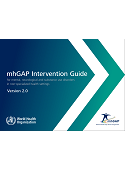MhGAP Intervention Guide for Mental Health, neurological and substance use disorders in non-specialized health settings - Version 2.0 (2016)

Download
According to WHO Mental Health Atlas 2014, more than 45% of the world population lives in a country where there is less than 1 psychiatrist for every 100,000 people and there are even fewer neurologists. It is clear that relying solely on specialists to provide services for people affected by mental, neurological and substance use (MNS) disorders would prevent millions of people from accessing the services they need. Even when available, the interventions often are not evidence-based or of high quality. The Mental Health Gap Action Programme (mhGAP) was thus developed with the objective of scaling up care for MNS disorders.
The mhGAP approach consists of interventions for prevention and management of priority MNS conditions, identified on the basis of evidence about the effectiveness and feasibility of scaling up these interventions in low- and middle-income countries. Priority conditions were identified based on the criteria that they represented a high burden (in terms of mortality, morbidity and disability), resulted in large economic costs or were associated with violations of human rights. These priority conditions include depression, psychoses, self-harm/suicide, epilepsy, dementia, disorders due to substance use and mental and behavioural disorders in children and adolescents. The mhGAP-Intervention Guide (mhGAP-IG) is a resource to facilitate delivery of the mhGAP evidence-based guidelines in non-specialized health care settings.
The Russian version is published by the Regional Office for Europe; The Italian version is published by Dipartimento di Salute Mentale (D.S.M.), Azienda Sanitaria Universitaria Integrata Trieste (A.S.U.I.Ts), Trieste, 34128, Italy



